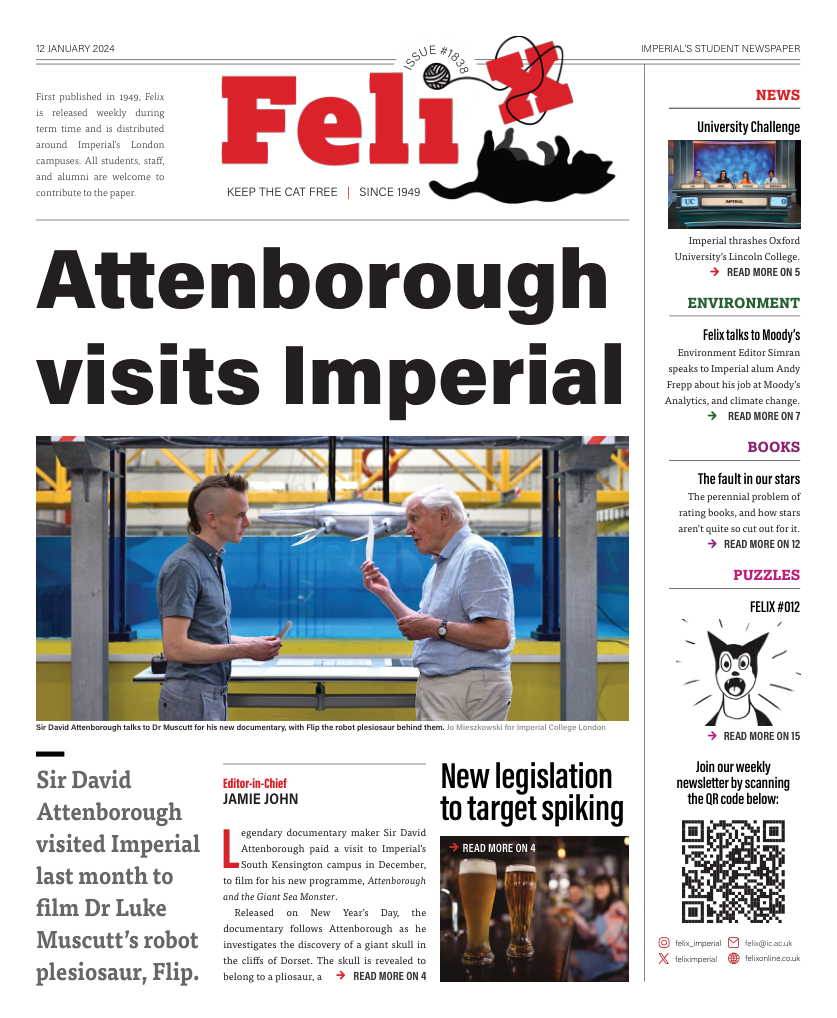An interview with Andy Frepp of Moody’s Analytics
Felix spoke to ex-Imperial Maths student Andy Frepp, discussing his career, and how climate change is affecting financial services.

Andy Frepp graduated from Imperial in 1985 and is now the General Manager leading the Enterprise Risk Solutions business for Moody’s Analytics.
What does Moody’s Analytics do?
Moody’s is still primarily known as a credit rating agency, but it has built a data analytics and software business over the last 12-15 years, called Moody’s Analytics. Moody’s Analytics provides the tools that banks, insurers, and asset managers would use to effectively manage the risks on their balance sheets. Our work spans the curation and cleansing of third-party data, using that data to create models and then building software to allow our customers to use the data and models in their business.
It is probably important from an Imperial perspective to know that there are a wide range of roles at Moody’s; understanding credit is very important but there are many other interesting and challenging roles. Only a few years ago, we would have just thought about credit as the main risk – maybe some of the other financial risks like interest rate risk. Today we are talking about integrated risk assessment. An organisation is obviously exposed to credit, but it’s exposed to a range of other risks – whether it’s cyber, ESG [Environmental, Social and Governance], or climate. We’re now starting to do the same data analytics and modelling which we did for credit on these new risks. And all these risks potentially have some relationship, so we’re doing some interesting correlation modelling.
Maths teaches you that there is a structured way of solving problems which helps you hugely, particularly in the business I’m in.
As an example, in terms of climate change, we do a lot of work in looking at future climate scenarios and the impact those scenarios will have on financial & other assets. We also look at the analytics around companies transitioning to a net-zero world – whether it’s carbon credits, renewable electricity, or something else. We also work on where companies should think about putting physical assets like a wind farm – what will the wind patterns be, is the area prone to earthquakes or hurricanes, and what that means for engineering.
Can you give us a brief outline of your journey as a Maths student at Imperial to General Manager of Moody’s Analytics?
I did Maths at Imperial. At that time if you studied Maths, you ended up going into either accountancy or actuarial science. I chose actuarial science and went to work for a life company in Edinburgh, called Scottish Widows. Once I qualified, I realised I didn’t want to do any of that technical work, so I instead spent the next 15-20 years doing business-related roles at Scottish Widows – principally at the customer end of the business. Somewhere in there, I did an MBA. I got to a fairly senior level, and when you get to that level there’s a choice you make. Do you want to continue to climb one long and complex corporate ladder, or do you want to do something else? I decided to leave my senior well-paid position and join what you might call a startup today, called Barrie & Hibbert. This was a very niche, technically focused modelling and software business for life insurers. They were doing leading-edge maths for the evaluation of life insurance company guarantees. The founders wanted somebody to build a business, so I went there, and we successfully built the business over five years as CEO. We then decided to sell the business and we were bought by Moody’s in 2012. From 2012 onwards we integrated into Moody’s. At some point, my current boss wanted me to come to New York and help build what currently is Moody’s Analytics into a bigger business. That’s what I’ve been doing since 2014. Over the last 10 years, we built a franchise for a thousand insurance customers, generating hundreds of millions of dollars in revenue. We’ve got a very extensive insurance analytics business, which ranges from valuing complex derivatives for life insurers to complex hurricane and earthquake modelling. So that’s how I got to where I got – there was a lot of luck along the way.
How has your time at Imperial helped you in your current role?
Just being at Imperial – the name helps. There is a natural assumption about who you are and what you do as an Imperial graduate. Secondly, doing a straight Maths degree at Imperial was ridiculously difficult and required a lot of hard work. There’s something intellectually challenging about doing complex analyses at Imperial. Maths also teaches you that there is a structured way of solving problems which helps you hugely, particularly in the business I’m in. Thirdly, Imperial students have got a great grounding in how to translate complex things into simple words. I was primarily at the customer end of Barrie & Hibbert, but being able to understand their highly complex stochastic differential equations, and translate that into what a customer might think, is a huge benefit.
How is climate change affecting financial products and services?
One of the challenges with climate change for companies is that any financial impact is perceived to be too far in the future. For most organisations, thinking five years out is a long time – even for financial institutions who have longer time horizons, thinking about 2050 is a challenge. So, you have this tension between knowing the impact of climate change in 30-40 years but those impacts not translating into substantial financial impact today.
If you look at economic losses caused by climate events in any one year, only about a third of the loses are covered by insurance; the balance ends up being picked up by governments, companies and ultimately me and you.
The way to think about this is not to focus just on the future impacts of climate change, but what has and is happening now. You see everyday news stories about more frequent and severe climate events – these immediate risks are real and can have significant implications for companies around the world. Insurance can help to mitigate these risks, but it is becoming increasingly difficult for insurers to actually cover some of these risks – insuring properties in areas where there is increased risk of wildfire (California, for example) or insuring properties from hurricanes or floods in Florida. Helping insurers model these risk more accurately so they can offer insurance is something we are very focused on.
Climate change is also having a material impact on many business sectors other than insurance. The risk to physical assets is growing and insurers do not and maybe cannot cover all of these risks. If you look at the economic losses caused by climate events in any one year, only about a third of the loses are covered by insurance; the balance ends up being picked up by governments, companies and ultimately me and you. So not only are we building models and tools to help insurers, we are also helping companies and governments to better understand the risks that they are retaining by essentially self insuring. Take a bank, lending money to companies to invest in a building in areas that are significantly at risk from hurricane or flood. It is getting more difficult to insure these buildings, but for the bank the building is the asset that is backing the loan should the company default. If the building gets destroyed from a climate event and the company defaults on the loan then the bank has nothing. Our models and analytics can help the bank identify and quantify this risk.
Can Imperial students without finance backgrounds who are passionate about the environment get involved in Moody’s Analytics?
Yes. The actual underlying financial analysis is not that complicated – any student at Imperial has enough grounding in Maths to do pretty much anything in finance. There are certain jobs where we look for technical skills if somebody wants to build financial models, hurricane models, or earthquake models. But generally, what is more important to me is the person themselves – particularly things like intellectual curiosity and interpersonal skills. I wouldn’t see Moody’s as a financial services company. We deal with financial things, but at the end of the day we are helping our customers with business risks and decisions. There are lots of opportunity here - you’ve got product management, marketing, business strategy, and customer facing roles for the folks who don’t come from a finance background. In our graduate recruitment programs, we tend to take up very broad range of disciplines.









